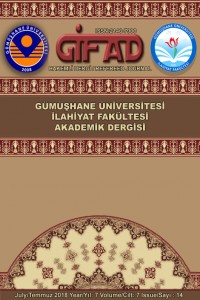Öz
Kaynakça
- Abstract Autonomy is a central value in ethical theories and individual ethical autonomy is an idea that is generally cognized to refer to the capacity to be one's own person, to live one's life according to reasons and motives that are taken as one's own and not the product of manipulative external forces. Autonomy has traditionally been thought to connote independence which lies at the bottom line of moral responsibility. When we take for granted that man is ethically autonomous being then the following question needs to be answered: what are the main motives that cause an ethical autonomous being to act? Hedonism, benefit? This discussion causes us to consequentialist or deontological/categorical ethics. To clarify the question do the ethical actions of ours have an aim in themselves or do we have to carry them out just because it is our duty to behave this way? Following this question in this paper individual autonomy is analysed in Mâturîdî from ethical point of view. It is well known that relation between God and man is the key topic in his Kitâb at-tawhîd and Ta’wîlât al-Qur’ân and he extensively deals with different aspects of this broad problem – the will, the power, the eternal decree and the creative function of God.
Öz
Otonomi, ahlak teorilerinde temel bir
yere sahiptir. Bireysel ahlaki otonomi ise kişinin kendine ilişkin kapasitesine
referansta bulunur ve bu kapasitenin dışarıdan manipüle edilmeden kendi içinden
gelen gerekçelere ve itkilere dayalı olarak işlemesine işaret eder. Otonominin
geleneksel olarak ahlaki sorumluluğun temelinde yattığına inanılmıştır. İnsanın
ahlaken otonom bir varlık olduğunu peşinen kabul ettiğimizde hemen ardından şu
sorunun cevaplanması icap eder: Ahlaken otonom bir varlığı hangi motifler harekete
geçirir? Haz mı, fayda mı? Bu tartışma bizi amaç ahlakına yahut ödev ahlakına
(deontolojik/kategorik ahlak) götürür. Daha da netleştirmek için şu soruyu
soralım: Ahlaki eylemlerimizin kendinde bir amacı mı vardır yoksa bizzat bir
ödev olarak mı onları yapmaktayız? Bu soruya cevap arama sadedinde elinizdeki
metin ahlaki otonomi kavramsallaştırmasını Mâtürîdî’de ele almaktadır.
Biliyoruz ki Mâtürîdî düşüncede Allah-insan ilişkisi ciddi bir yere sahiptir ve
elimizdeki iki eseri Kitâbu’t-tevhîd ve Te’vîlâtu’l-Kur’ân’da bu tema, irade,
kudret, kaza, kader ve Allah’ın yaratıcı iradesi gibi kavramlar etrafında
işlenmektedir.
Anahtar Kelimeler
Kaynakça
- Abstract Autonomy is a central value in ethical theories and individual ethical autonomy is an idea that is generally cognized to refer to the capacity to be one's own person, to live one's life according to reasons and motives that are taken as one's own and not the product of manipulative external forces. Autonomy has traditionally been thought to connote independence which lies at the bottom line of moral responsibility. When we take for granted that man is ethically autonomous being then the following question needs to be answered: what are the main motives that cause an ethical autonomous being to act? Hedonism, benefit? This discussion causes us to consequentialist or deontological/categorical ethics. To clarify the question do the ethical actions of ours have an aim in themselves or do we have to carry them out just because it is our duty to behave this way? Following this question in this paper individual autonomy is analysed in Mâturîdî from ethical point of view. It is well known that relation between God and man is the key topic in his Kitâb at-tawhîd and Ta’wîlât al-Qur’ân and he extensively deals with different aspects of this broad problem – the will, the power, the eternal decree and the creative function of God.
Ayrıntılar
| Birincil Dil | Türkçe |
|---|---|
| Bölüm | Araştırma Makaleleri |
| Yazarlar | |
| Yayımlanma Tarihi | 15 Temmuz 2018 |
| Kabul Tarihi | 3 Temmuz 2018 |
| Yayımlandığı Sayı | Yıl 2018 Cilt: 7 Sayı: 14 |


